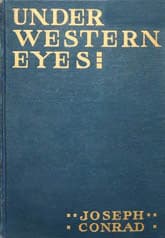Under Western Eyes
Critique • Quotes
 First U.S. edition, 1911
First U.S. edition, 1911First publication
1911
Literary form
Novel
Genres
Literary
Writing language
English
Author's country
England
Length
Approx. 121,000 words
From Russia with feeling
At least one reprint edition of Under Western Eyes is decorated with nautical graphics, as someone must have thought befitting a Joseph Conrad yarn. Not realizing, of course, this is a Conrad story unlike almost any other.
The closest Under Western Eyes comes to adventure on the seas or in exotic colonies is intrigue in the streets of St. Petersburg and Geneva.
But it's not just the land-locked Russian and European locales that mark this as a different kind of Conrad novel.
It's one of Conrad's most overtly political stories, following the exploits—or non-exploits rather—of a Russian university student who gets caught up in a revolutionary movement. (The novel was published in 1911, just six years before the actual revolution in Russia.) Though Conrad's view is cynical as always, he is obviously at least partially sympathetic toward the revolutionists who were responding to the oppressive tsarist regime.
But when I first read Under Western Eyes I was somewhat outraged, for the main characters are nothing like the left-wing activists I had known. Conrad's radicals are either assassins throwing bombs at public figures or sentimental dilettantes supporting the bomb throwers from afar without getting their own hands dirty. They're the fringe figures who give genuine revolutionaries, organizing mass movements, a bad name.
Moreover, the characters act and speak with an hysterical earnestness, as though they are all on the verge of becoming unhinged. The protagonist Razumov is indeed falling apart, having betrayed a colleague to his death and fighting his conscience while acting as a double agent within expatriate circles. But such is the heightened distemper of the entire cast that his bizarre behaviour is barely noticed.
Antiquated ideas
My later reading of Under Western Eyes was more forgiving. Conrad was writing about the radical characters he was familiar with, either directly or through his own reading. It's unfair to complain he didn't focus on the kind of revolutionaries who would have a much greater impact on developments in the twentieth century. Although it is quite a different book, Under Western Eyes is a descendant of his earlier novel of terrorism in London of the 1880s, The Secret Agent.
In any case, it's the people that Conrad is most concerned with, not the politics or the movement. Conrad himself has said he is most interested in the ideas of this novel, but the evidence of the novel—at least as read from today's perspective when some of those "ideas" seem antiquated—is that he cannot help but put the human relations among the conspirators to the fore. The bombing in St. Petersburg, the confrontations with police, and the clandestine meetings end up providing Conrad with scenes to bring out the personal motivations and obsessions of the characters—especially those of the guilt-ridden Razumov as he deceives his way into their midst, only to fall in love with the sister of the man he had betrayed.
The resulting intensified emotionalism in this novel is so unlike other Conrad, whose greatest influence on modern literature may have been his dispassionate prose that uses objective detail to build up atmosphere and suggest the greater subjective depths. Here, rather, the characters carry their hearts on their sleeves and are subject to outbursts of Shakespearean confession.
I blame Dostoyevsky. Under Western Eyes is said to be Conrad's response to Crime and Punishment, his Razumov a continuation of the earlier deluded Raskolnikov. It's unfortunate he also picks up the Russian writer's excitability.
Conrad has an out though. As with many of his works, this one embeds the story within narrative shells. At the most superficial level is of course Conrad himself, a transplanted Pole who wants to explain the Russian character to the Western world. The first-person voice he uses is that of an English professor who purportedly finds Razumov's incomplete diary and translates it from Russian into English, filling in the missing bits with his own observations (or possibly making up much of it? we don't know) all the while declaring his own poor understanding of Russians. Even the parts we accept might have come from the diary with minimal distortion are the products of Razumov's feverish interpretation. Taking into account all these difficulties, narration of Under Western Eyes comes to resemble an exercise in what philosophers call radical translation.
Given these parameters, Conrad is entitled to—obliged to—drop his usual calm, reflective tone and tell the story in this overheated fashion.
So, I understand it. I just don't like it.
Though perhaps a third reading some day will bring these Western eyes around all the way to appreciating Conrad's strangest novel.
— Eric
Critique • Quotes

